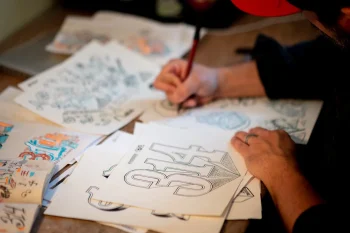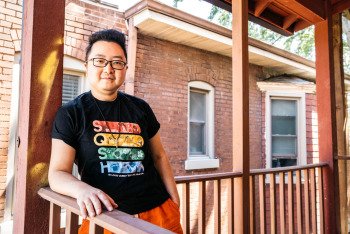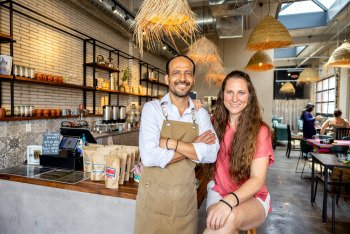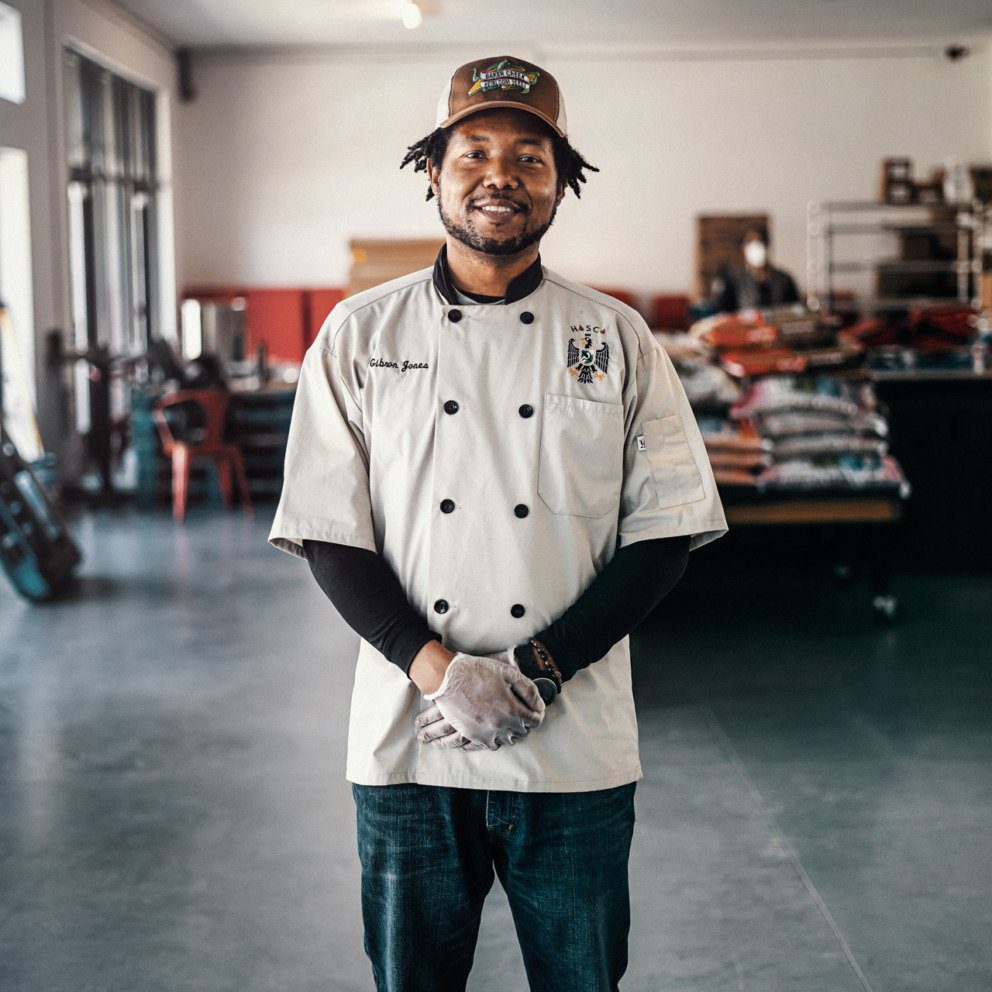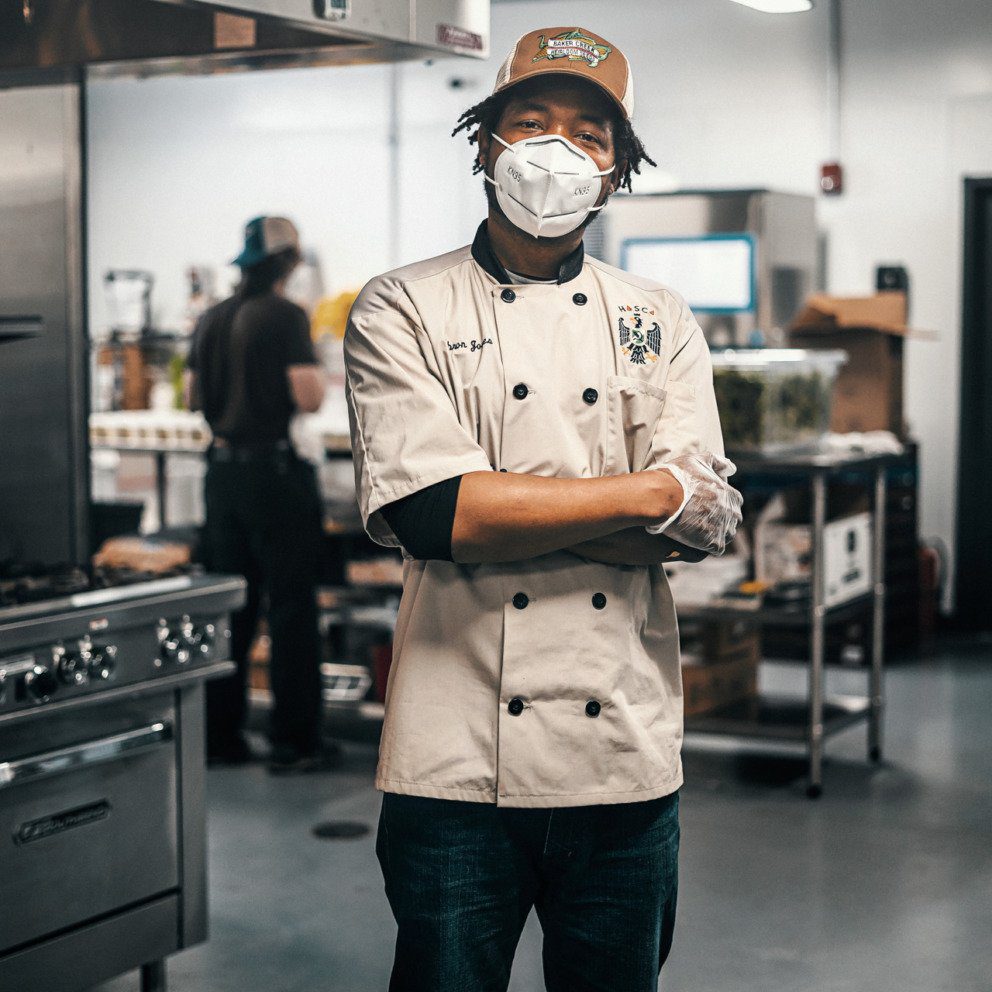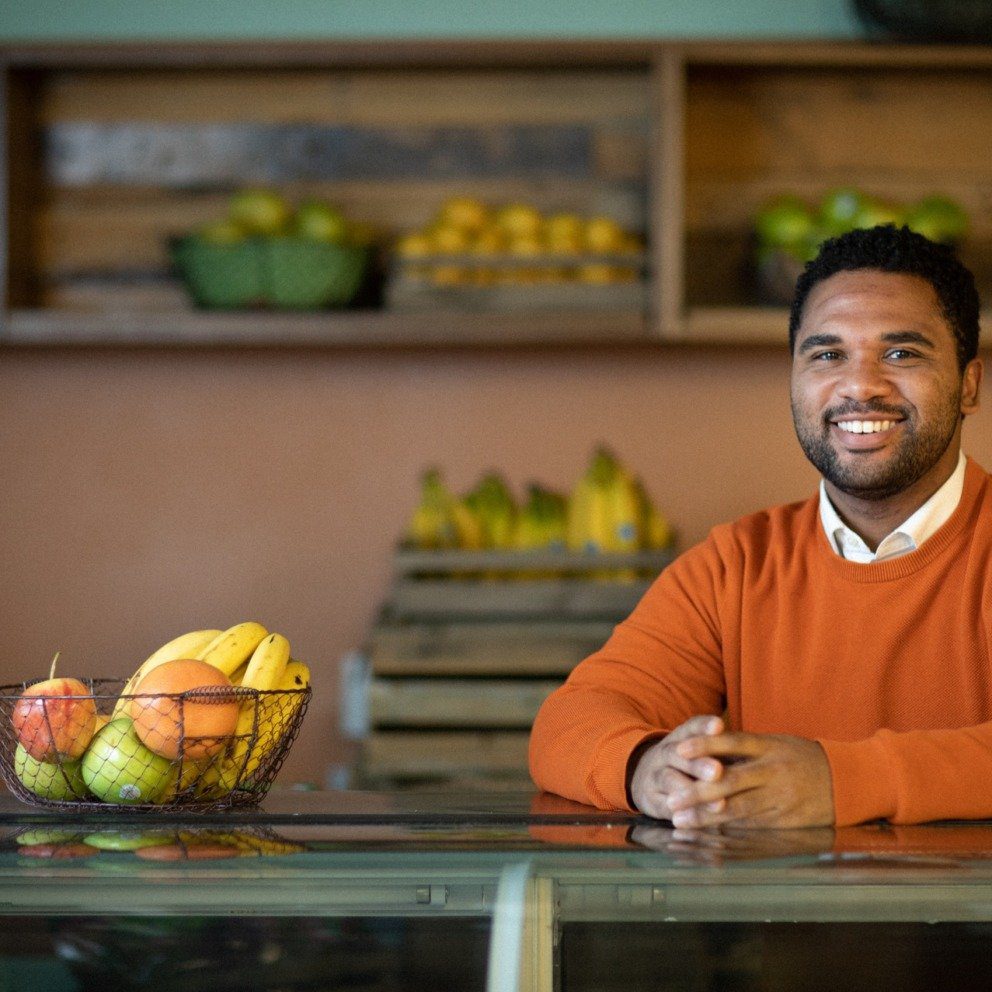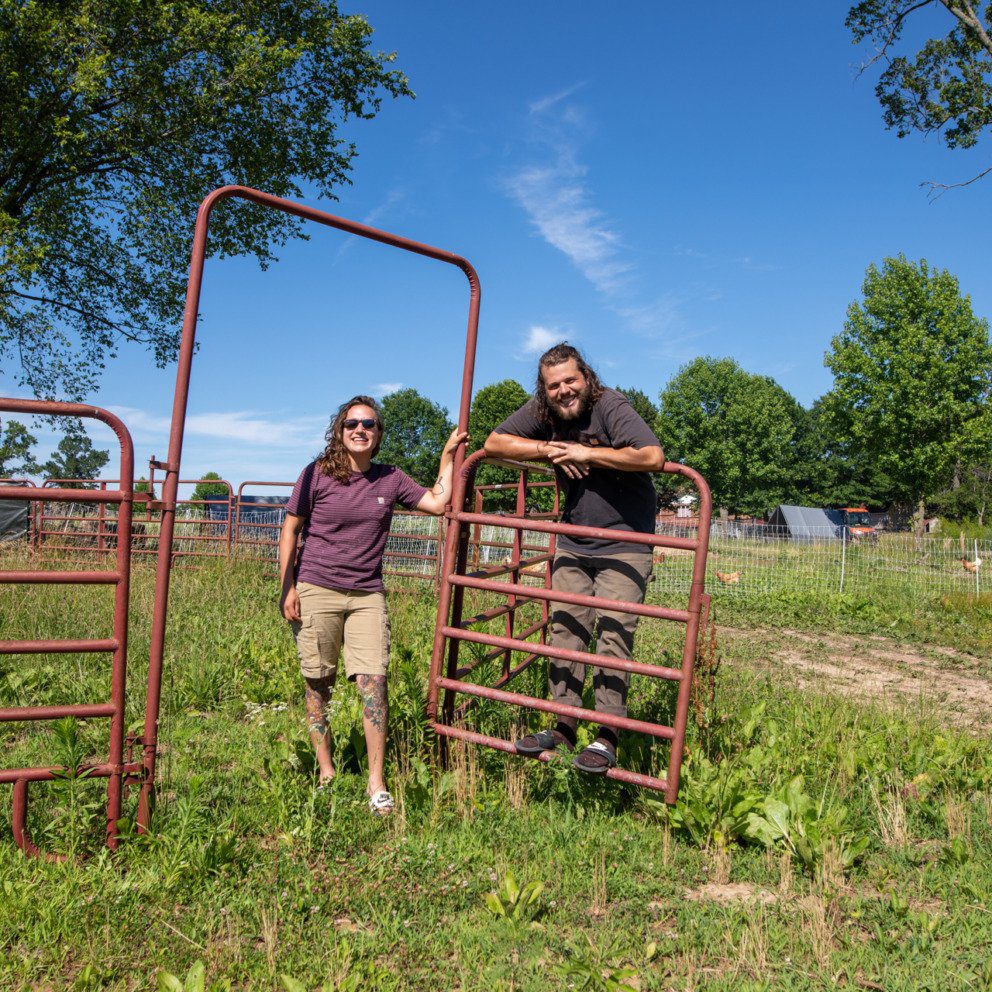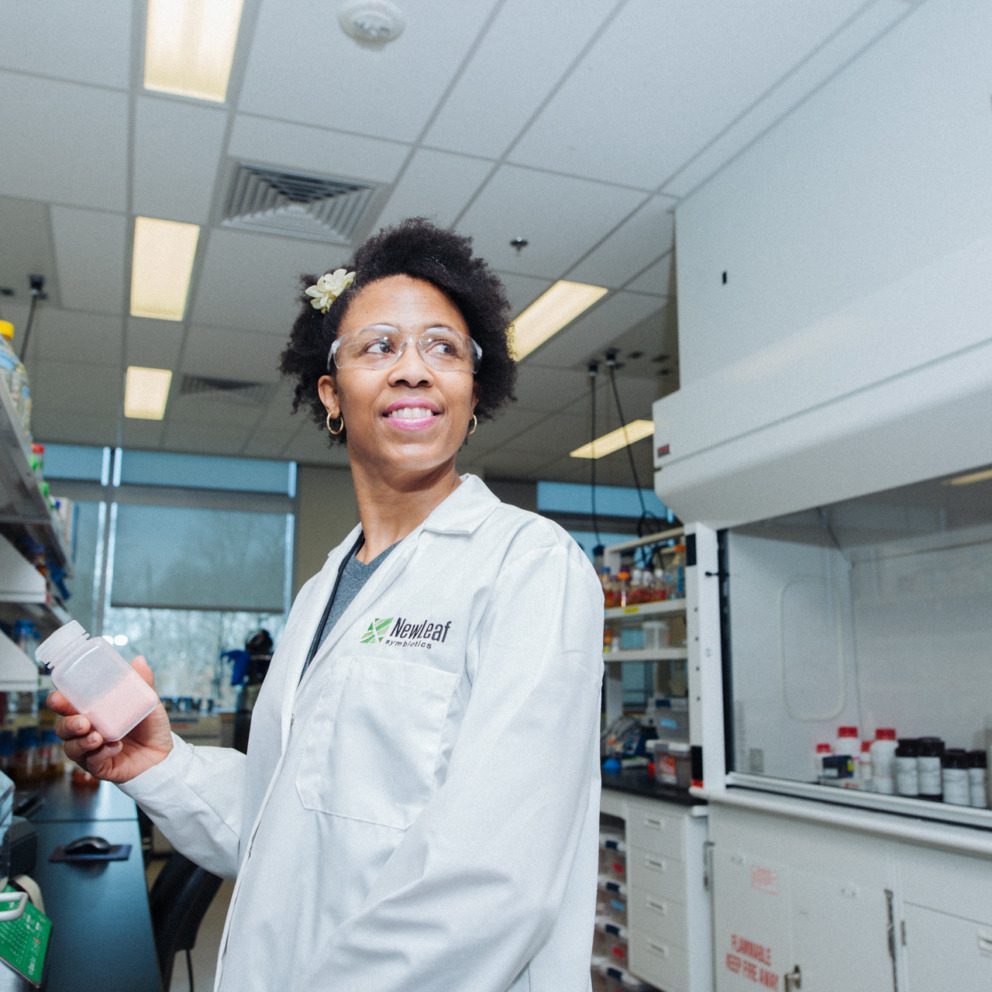Freedom Through Food
Urban farmer Tyrean “Heru” Lewis brings fresh produce to underserved communities and advocates for more equitable growing practices across St. Louis and the nation.
When asked to paint a picture of what is currently growing on his farm, Tyrean “Heru” Lewis comes alive: “I’ve got blackberries, raspberries, plum trees, apple trees, elderberries, beehives, a chicken coop, some collards, some Japanese mustards, some curly kale, sage, oregano, basil, mint, all different varieties of tomatoes and peppers, cucumbers, okra, carrots, watermelon …”
The list goes on. A former physical education teacher turned urban farmer, Lewis says his passion for growing fresh, healthy food is something he inherited from his ancestors. He attributes his success as a fifth-generation grower to the legacy they started. “I lean on my ancestors,” he says. “Even when I started, everything I touched did well. People would be asking, ‘How do you do that?’ I’d say, ‘I pray to my ancestors.’”
That said, Lewis didn’t connect to this part of his heritage until his farming career was already underway. Initially, it was a highly discouraging grocery shopping experience that prompted the beginnings of his farming enterprise. In 2017, he was searching for ingredients to prepare a vegan meal. After visiting the grocery store closest to his home in North St. Louis, where the display of food was wilted and unappetizing, he found himself traveling further and further west into St. Louis County in order to find fresh ingredients.
“You compare a grocery store on Union to one on Lindell, it’s totally different. Then you go a step further to Clayton, man, that’s awesome. Then you go to West County, that’s the best,” Lewis says. “About 850,000 people in the St. Louis metro area don’t have sustainable, healthy produce within a half mile of their community. You’ve got all these gas stations and Family Dollars and Dollar Generals–a lot of processed food. You might get lucky and find a banana or an orange by the cash register. Man, we want to eat dragon fruit too!”
Today, food justice advocates refer to this phenomenon as “food apartheid” in lieu of the more commonly known term, “food deserts.” As Lewis explained in an essay for the nonprofit organization, WEPOWER, “A desert is natural, right? The lack of access to fresh food in Black neighborhoods is not natural… Food apartheid describes how food suppliers deliberately create food vacuums in underserved communities like mine.”
In his role as a Black urban farmer, Lewis, whose spiritual name, Heru, means “liberator king” in Ancient Egyptian, seeks to do exactly that — liberate his community from the myriad health risks associated with unequal access to nutritious, high-quality food, from diabetes to gun violence. Along the way, education and mentorship from local startup business accelerators have been instrumental to Lewis’ efforts to advocate for food justice in the city of St. Louis.
His farming journey began humbly.
“I just started off just growing food in buckets,” says Lewis. “And, man, when I first tasted a lettuce that I grew, and a tomato, I was like, wow, it tastes like this?! I didn’t know it could taste that good.”
He then expanded his crops from buckets to a nearby vacant lot, and in 2019, he received a grant from The BALSA Foundation, a local nonprofit that supports first-time entrepreneurs as part of a broader mission to improve social equity throughout the St. Louis region. “[They] taught me simple startup stuff, like how to pitch my product,” Lewis says. Then, in 2020, Lewis participated in a 10-week development program for Black and Latinx entrepreneurs offered by WEPOWER, another St. Louis civic organization that seeks to better the city by advancing opportunities for historically underrepresented groups. Through its Elevate/Elevar Accelerator program, Lewis received additional access to capital as well as one-on-one business coaching and personal wellness support, among other services. “It was cool because I learned a lot of behind-the-scenes types of information, like profit margin, most valued customer and keys to marketing,” he says.
Most recently, in 2021, he went through the University of Missouri-St. Louis Diversity, Equity & Inclusion Accelerator program, which afforded him $50,000 in capital and a host of other resources, including mentorship, customized training and access to UMSL student and faculty networks and expertise. Upon graduating, Lewis was able to hire two full-time employees and purchase farming insurance and specialty equipment that extended his growing season.
Empowered by these experiences, Lewis has built connections with an entire network of urban farmers and food justice activists throughout the city of St. Louis, many of whom are also advancing representation in the field. One of them is Tosha Phonix, who has been growing sustainable produce in the city for more than seven years, teaching children coping with chronic homelessness how to farm. Having alerted Lewis to his first accelerator program at BALSA, she now dedicates herself full-time to building connections between local Black growers and linking them to vital community resources in her role as co-founder and director of EVOLVE.
As Lewis increased his knowledge and skills, he needed more land to farm, and thanks to an invite from Gibron Jones, founder of the North Sarah Food Hub, was able to take advantage of the opportunity to grow his crops at Confluence Farms in Florissant. Confluence is a farming collective of sorts, where several farmers and entrepreneurs grow crops, all with the goal of sustainably growing produce for communities with limited access to fresh foods.
At Confluence, Lewis’ plots neighbor those of Leah Michelle Lee, a Black woman farmer and founder of another St. Louis-based food justice group, Growing Food, Growing People. In addition to feeding her community and supplying chefs with locally grown produce, Lee and her team teach gardening skills to young people through the organization’s Junior Farming Program. They also lead gardening and wellness workshops at social service agencies.
Being part of such a thriving network of like-minded farmers and advocates has been key for Lewis.
“I got overwhelming support,” he says. “I couldn’t even complain. I hate to say that sometimes St. Louis gets a bad rap, but we got great people. It’s just overwhelming, people are always helping me out.”
Most recently, Lewis has joined forces with Molly Rockamann, the founder and CEO of EarthDance Organic Farm School, a 14-acre teaching farm located on a historic property in Ferguson, Mo., and Mina Aria, leader of another local food justice organization called New Roots Urban Farm. As members of the National Young Farmers Coalition, the trio is advocating for a slew of changes to the 2023 Farm Bill, a piece of national legislation that renews every five years. Their participation in regional and national meetings will culminate in a March 2023 trip to Washington, D.C., where they will ask Congress to make a 10-year, $2.5 billion investment in the next generation of American farmers, providing them with equitable access to one million acres of land — an initiative known as the One Million Acres for the Future Campaign.
As Lewis’ farm has grown and evolved, he has also forged meaningful, reciprocal relationships with a variety of community stakeholders who benefit from eating the food, working the land and just being exposed to a city farmer outside the traditional demographic. His network includes an extensive and diverse group of volunteers who come from organizations such as St. Louis Agency on Training and Employment, STL Youth Jobs, the Missouri Botanical Garden Outdoor Youth Corps and The Village, all of which provide occupational training to local youth.
These connections with local youth are one of the most important aspects of what Lewis does, a way for him to continue the work he started as a teacher and while working at Covenant House, which helps unhoused children.
“It’s about food, but it’s really deeper than food,” Lewis says of his work. “It’s the human connection that I like the most.”
With the help of this robust corps of volunteers, Lewis was able to launch a Community Supported Agriculture program, selling 12-week subscriptions for which customers received a weekly selection of produce. Mindful of his vocation as “Heru,” or liberator, he donates a box of food to nearby families in need for every five CSAs sold. This year, he has dialed down this aspect of his business in order to focus on feeding elderly residents at a North St. Louis retirement home, made possible by a grant from the St. Louis Philanthropic Organization.
When asked about his plans for the future, Lewis lays out an ambitious vision that goes beyond growing food. “I want to have my own homestead,” he says. “I’d like 50 to 100 acres. I’d have my fruit tree nursery — peaches, plums, apples, cherries, things of that nature. I’d have a human-made pond so people can come out and fish. I’d have goats, chickens and a space for people to camp. I’d have a ‘you pick it’ setup with strawberries people can pick themselves. I’d invite people out for spiritual retreats, weddings, camping. I want to foster agritourism, where kids come out, do a hay ride tour and practice working the land.”
There is an ease about him when he talks about tending to the land. Perhaps he is channeling the spirits of his ancestors. They, too, were recognized by their community for their talent and ingenuity. His great uncle, Minor Washington, and Minor’s son, Ernest, won awards in Lamar County, Texas for growing first-rate watermelon, purple hull peas, corn and tomatoes.
Like his forefathers, Lewis’ farming success is rooted in his passion for growing exceptional food and his zeal for finding the freshest ingredients, going back to that challenging vegan meal in 2017. Reflecting on the life and business he has built for himself, Lewis feels his father smiling down on him. “My dad always told me before he passed, do something that doesn’t feel like work,” he says. “This doesn’t feel like work.”
His job at Heru Urban Farming not only allows him to enjoy the journey, it also gives him a clear sense of purpose:
“St. Louis is my home, you know? I think all St. Louisans have a responsibility to make the city better in their own way. I think my way is growing food, bringing fresh food to my community.”
Join the Story
Find Lewis’ harvests at City Greens Market in the Forest Park Southeast neighborhood, North Sarah Food Hub, a nonprofit that works to combat hunger and food insecurity and Be Well Cafe and Farmer’s Market, another St. Louis nonprofit located on Salisbury Street in the Highland Park neighborhood.
